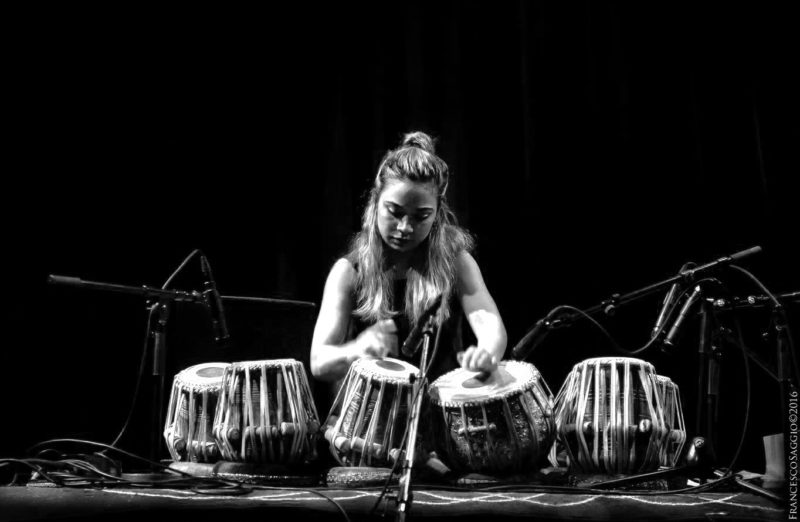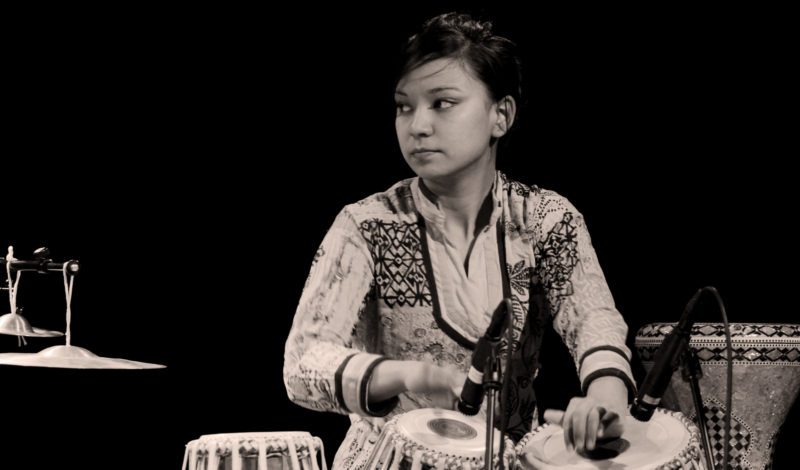Sanskriti Shrestha

CS
What convinced you to play music professionally?
SS
The combination of my love for what I do and the opportunities I got, are what naturally took me into the direction of making music my profession.
CS
Was it immediately clear that you would focus on the tabla as an instrument?
SS
When I started playing Tabla I was very little and it was more of a toy for me. I was sent to dance and Vocal classes but the way I bonded with the sound of the Tablas and the way I could communicate with the language of Tablas, was different than any other musical direction I tried to go into. So yes, I would say it was pretty clear that Tabla was the instrument I would focus on.
CS
You moved from Nepal to Norway to study music. Which program did you choose and why Norway?
SS
I had always wanted to go out of my country to study for discovering the different styles or the scene of music. Of course the tradition I come from is very rich and the process of learning never ends but my heart always said there is more! It started with the interest of learning different kinds of percussion traditions. Norway was the first country overseas I travelled for performing. It was a talent project in Forde folk music festival. I was 17 years old and very curious and keen to play with everyone. I got to get in touch with many good musicians and also travelled here the year later for a tour with the Local musicians. In that way, it was very natural for me to move to Norway since I already had some projects starting before I moved here. I got enrolled in a program called “Free candidate study program” where you basically build your own syllabus working together with the teachers. It is made for the applicants who are good but there Idea’s or the work doesn’t fit into any of the study programs that the school can offer. I am very happy that I could be under that program and the academy had such an open platform.
CS
During your studies, were your peers interested in Nepalese traditional music?
SS
Yes, they were interested in both Nepalese and the Hindustani traditional music. One of the reasons many people I have collaborated with chose to have me because they are also interested on the musical background I come from. I have also worked with different folk musicians where I mostly try to bring a lot of materials from the Nepalese folk tradition too.
CS
Should western and non-western music still be treated differently in music education?
SS
Is it time to get rid of the divide?I personally think the line between the western and non-western music has been fading out gradually since a couple of centuries. That includes the education too. People are very much open to all sorts of music and especially in times like now where we have access to reach to anything we like, the division is disappearing itself.
There shouldn’t be any boundary between any kind of genres but yet keeping its own identity is also important for deepening the learning process of any kind of music tradition. Richer the tradition is the more we can broaden up the way we bring it together. When it comes education, I don’t necessarily think we have to get rid of the division between categories but it’s definitely essential to have the programs where people can get deepened knowledge about the genres they want to explore which also helps in new creations.
In this, I would like to add that I have felt the division when it comes to the platform. Some venues want to have certain kind of music. Here, I am not talking about the fusion music we know about.
Sometimes for a musician like myself who likes to bring in different inspirations together and create something new, a new sound, it can become little difficult to get the platform to perform it. It is not always very easy to categorize everything specifically and that becomes a challenge, I think.
CS
What is your personal relationship with traditional Nepalese music?
SS
I was born in Nepal, and the traditional music in Nepal is not there just for performing or expertise but is very much included in our daily life. It is as rich as the culture itself. Therefore, it is in my blood and I connect to it very easily and naturally. I also sometimes perform Nepalese classical or folk dance which is like meditation for me. It brings a different personality to me. In this last few years, I have been aware of the fact how the music from my own ethnic group is getting extinct and I really feel that I have a responsibility to protect it and bring it more forward in different musical context.
CS
Should we guard and protect traditional music, make sure it’s written down and recorded for future generations?
SS
Yes, Definitely! We have always learned from the old and that’s how we have been able come up with many interesting idea’s and creations. I feel that I am able to do what I am doing now and adapt to all other kinds of music because I have a strong bond my the traditional music or the tradition I have followed. My own tradition has always been a major inspiration for me in my work.
CS
The link between all the artists booked for the Eastern Daze festival is that they reach a state of trance with their music through repetition.
SS
I agree with that very much. I love the process of repetition. One thing I have experienced is that the repetition gives you time to really get into tones and rhythms and feel it. It’s like you let the vibration from the instrument do it works. In this process, I usually feel that I become so small and the sound just covers everything around me. It also puts a huge impact on the changes you bring after each repetition, which makes both musician and the audience feel what is going on.
CS
How important is that state of trance for you? Does it give you energy?
SS
Yes, it is important for me! Whenever I have had a chance to take my time, have repetitions and feel it, I am more myself and I become one with the music. Like they say in Sami vocal tradition “Joiking”, one doesn’t Joik about someone but one Joiks someone or something. In the same way, I feel what I play is the transformation of myself than I am playing something. Everything in nature and around us has its cycle and it repeats. It applies to music too and it definitely gives me a lot of energy during the performance or while I am practicing. Especially I do that very much when I practice.
CS
What’s the biggest difference between Asian and European music scenes?
SS
I can’t talk about Asia in general but I feel that the European music scene is very open to innovations whereas in some parts of Asia we like to keep the tradition. Going far away from that is something not everyone can digest. You might sometimes be mistaken for it and people might think you do what you do because you are not skilled enough to carry on the tradition.

CS
Tell me something about your sextet Avatar.
SS
Avatar is a band that I put together a year ago. It is an outcome of all the new influences and forms of music I have encountered these last years. Especially the creative thinking, openness, free style of playing, spontaneity is something that I experienced a lot in the music scene here in Europe which I just love. At the same time, I can’t stop getting fascinated by all sorts of old traditional music I have come across. From the Tibetan prayers to the noise music, all of it is so powerful and gives so much that you have to somehow express it out in some way. So as a musician processing it out through my own compositions was the best way and that’s where Avatar comes in the picture.Most of the players are mostly occupied with jazz and improvised music. Some of them are also very much into folk music. I think the band gets different elements from the each member while sharing the same direction of creativity, which has given it a very distinctive sound.
CS
What do you like most about improvisation?
SS
Freedom!
CS
When does improvisation go wrong?
SS
For me, it is when I don’t feel like I can contribute to something that’s happening and that doesn’t mean not playing!
CS
What’s in the future for you?
SS
In the future… there is a lot of music! The first half of 2017 will be occupied by tours with bands that I play in. Avatar will be giving out its debut album in autumn 2017. I am also very glad to be doing solo projects, which people will get to listen to more of it in near future. There are always a lot of ideas popping in my head which I don’t always get time to work with. I really look forward to experiment all those ideas and hopefully, it will be something I can present it or share with people and experience it together with the music lovers.